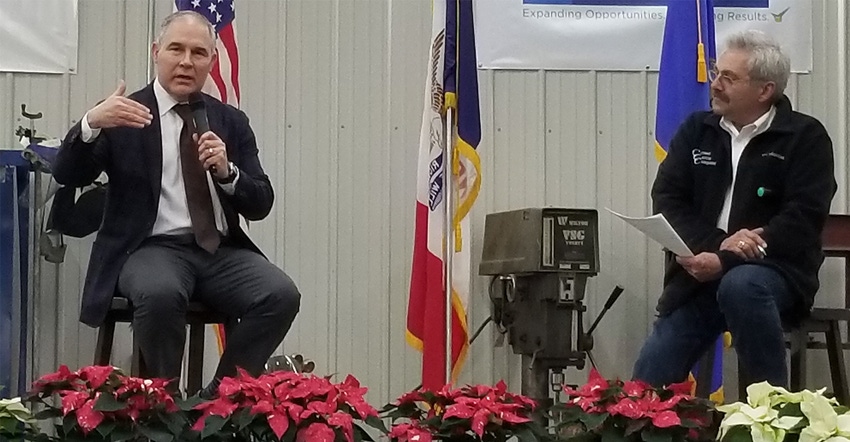December 5, 2017

The administrator of the U.S. Environmental Protection Agency came to central Iowa to speak to a crowd of about 150 farmers and others Dec. 1 — just one day after his agency released the new renewable fuel blending requirements for the coming year.
At the event held on the farm of Bill and Nancy Couser at Nevada, Iowa, Pruitt worked to win the support of farmers, along with ethanol and biodiesel producers, who are uncertain about the EPA chief’s commitment to renewable fuels.
Pruitt noted: “This week, EPA required a maximum 15 billion gallons of corn-based ethanol to be blended into the nation’s fuel supply in 2018. We met the Nov. 30 deadline to actually get those volume obligations announced, a deadline the agency hasn’t met in a number of years. And I made a commitment during the process to look at you as a partner. To think of farmers as adversaries who don’t care about the water you drink or the air you breathe is just simply wrong-headed.��”
EPA developing workable WOTUS rule
Pruitt said EPA is working to clarify which creeks, streams and other tributaries fall under federal oversight through a new Waters of the U.S. (WOTUS) rule. He repealed an Obama administration rule that was criticized as being too broad.
“The reasoning behind the rule implemented by the previous administration in 2015 was clarity. But they failed miserably,” said Pruitt. “Their WOTUS rule created substantial confusion across the country.”
Pruitt answered selected questions from host Bill Couser, who farms with son Tim, producing cattle and row crops. Pruitt, a former Oklahoma attorney general, noted that farmers are under pressure in Iowa to reduce nitrogen and phosphorus runoff that pollutes lakes, streams and rivers, and eventually contributes to the dead zone in the Gulf of Mexico.
“Our nation needs to discuss what true environmentalism means,” Pruitt said. “Some people believe we should simply put up fences and not use our natural resources. I don’t buy that. We, as a country have an obligation to help feed and power the world. When you have the natural resources like we do, we should use them to benefit our neighbors, our country and the world.”
Setting volume standards for renewable fuels
After the event, Couser was happy with what he heard. “We as farmers and renewable energy producers now have a seat at the table,” he said. “We are no longer on the menu.”
In addition to the WOTUS rules and the Renewable Fuel Standard volume obligations, Pruitt talked about cellulosic ethanol production. Couser said Pruitt wants to set cellulosic ethanol standards that are attainable.
EPA has set the cellulosic production volume at 288 million gallons for 2018, 7% below the 2017 cellulosic ethanol goal. The industry has struggled to produce cellulosic ethanol, which uses cornstalks, crop residue, algae and other materials to make renewable fuel. A few miles from the Couser farm where Pruitt was speaking is the DowDuPont cellulosic ethanol plant. The company announced in November it is closing the plant and laying off 90 workers. The plant is for sale; DowDuPont says making cellulosic ethanol no longer fits with the company’s strategic plan.
Couser told Wallaces Farmer, “We just can’t seem to get there; can’t get cellulosic ethanol production going strong enough to meet the RFS goals. But we have to keep the cellulosic ethanol production goal high enough in the RFS to encourage growth, research and development.”
Disappointment over biodiesel volumes
Iowa Secretary of Agriculture Bill Northey, along with Gov. Kim Reynolds and Couser, had lunch with Pruitt. They discussed biodiesel, cellulosic ethanol and other concerns Pruitt has regarding renewable energy.
After their lunch discussion, Northey told Wallaces Farmer that EPA is concerned about the ability of biodiesel producers to meet demand for that fuel. The biodiesel industry disputes that notion, saying it can produce more biodiesel to meet higher RFS requirements — if biodiesel volumes were set higher.
Northey said Pruitt “certainly made the point that the RFS volume numbers are out and available on time, and we all appreciate that. Of course, we certainly wish that the biodiesel numbers were more aggressive than what they are.”
15B level still in place for ethanol
Monte Shaw, executive director of the Iowa Renewable Fuels Association, attended the event and listened closely to what Pruitt had to say. Shaw said, “I do want to give credit to EPA that they stayed with the 15 billion gallons for corn-based ethanol and they didn’t buy into any of these crazy ideas to undermine the RFS. But also to be fair, that is what was expected. The law says 15 billion gallons. President Trump had promised he would protect the RFS. So I want to say ‘thank you’ for not going below the 15 billion gallons.”
While the RFS sets the volume requirements for ethanol for 2018, it sets the biodiesel requirements a year ahead. In the recent RFS announcement, the final 2019 biodiesel level was flat-lined at 2.1 billion gallons, far below the industry request of 2.75 billion gallons. Many biodiesel producers are worried that the basically flat volume increase might send the wrong signals and curtail biodiesel industry expansion.
About the Author(s)
You May Also Like






